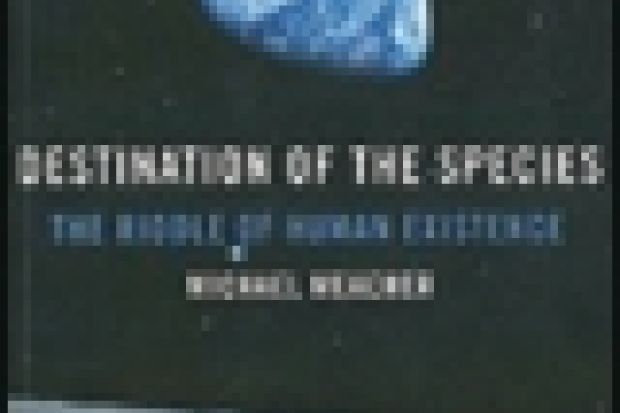When people joke about the meaning of life, it is a sure sign they are fretful. Is life driven by point and purpose, or is it a chaotic, rudderless and aimless flux? Was Shakespeare's ruminating Macbeth right - is life "a tale/Told by an idiot, full of sound and fury/Signifying nothing"? Worse still, could it be that humans are mired in a cruel, predatory existence, and doomed to unrelenting depression, deprivation, disease and death?
Michael Meacher is not the first to grapple with these teasing queries, but here he addresses them with an admirable earnestness on the basis of a broad and impressive array of knowledge. His is the same question as Monty Python's - "what are we here for?" He answers it on the fundament of three principal sources: the findings of modern and contemporary physical cosmology, considering the origin, extent and features of the observable universe; discussions about the genesis and evolution of life forms; and a consideration of how the world's religions developed.
Meacher explores the riddle of human existence, as he calls it, after the advent of 20th-century postmodernism, a creed revelling in the proclamation that the truth is that there is no truth, value is arbitrary, morals are made up, and life is no more worthy than a burp. Not to be overlooked is that he probes the serious issues of humankind's destiny in the wake of two genocidal global wars, practices of ethnically motivated homicide, the terrorism of gelid fanatics, and the chronic malnourishment and concomitant diseases of most people alive today. It is a bleak setting in which to ask about the meaning of life.
He launches his quest to unravel his riddle by considering first a range of distinct models seeking to explain the existence of the universe, and then strives to assess them, and theories derived from them. The thread linking the chapters of the book together is a cumulatively developed account of the likely destination of the human species.
This book's greatest strength is that it is a highly informed and articulate summary of the bedazzlingly complicated body of scientific data accumulated by astrophysicists and biologists about humans and their world. Where differences obtain between scientists and theorists, Meacher is careful to accurately depict opposing views.
For anyone seeking to be initiated into the dauntingly complex fields of contemporary empirical sciences and religions as they impinge on the question of human destiny, Meacher's text is an ideal source with which to begin. Early on he informs his readers that there are five major theories currently explaining the origin of the universe.
They maintain, variously, that the universe is infinite in time and extent and hence had no origin; that it is finite, but cannot be shown to have an origin at a particular point in time; that it came into existence out of nothing because of quantum fluctuation; that the universe arose from a singularity; and finally, that it was created by God, which is not to say that the notion of a divine creation jars with all other theories. Cosmologies are concerned with the nature and extent of the universe, not with the nature of God - the preserve of theology.
Amid all these theories, Meacher seeks to follow a path arguing that the universe is so intricately balanced ("finely tuned") in its constitutive elements that it could be the fruit of the intelligent design of a Creator.
On evolutionary biology, Meacher provides a careful account of the gradual emergence of life forms from extremophile bacteria to contemporary humans. He takes issue with the idea that the evolution of species is a gradual process over a vast scale of time: "Contrary to the Darwinian view that the Cambrian complexity emerged gradually over long periods of time in the Proterozoic era, it now seems likely that it developed only as the Cambrian period ... began about 543m years ago".
As to whether humans are unique, Meacher concludes that indeed they are because of their "spirituality" and the way their brains have developed. Yet he does not allow them to be rulers of the cosmos: "Humans are not the pinnacle of the cosmos ... just one species among many, with intelligence too little matched by wisdom and self-restraint for our own good." If humans do not become wise, their destiny is disaster.
This book could have been rendered more useful by the inclusion of an index and the adoption of a less idiosyncratic system of recording references. Peter Atkins is best depicted as a chemist rather than a philosopher.
After all that has been said, the reader must still decide whether it is almost entirely certain there is a God or almost entirely certain that there is not. As for the Universe, it is now expanding at a faster rate than anyone has hitherto predicted.
Destination of the Species: The Riddle of Human Existence
By Michael Meacher. O Books, 251pp, £9.99. ISBN 9781846942631. Published 29 January 2010
Register to continue
Why register?
- Registration is free and only takes a moment
- Once registered, you can read 3 articles a month
- Sign up for our newsletter
Subscribe
Or subscribe for unlimited access to:
- Unlimited access to news, views, insights & reviews
- Digital editions
- Digital access to THE’s university and college rankings analysis
Already registered or a current subscriber? Login
